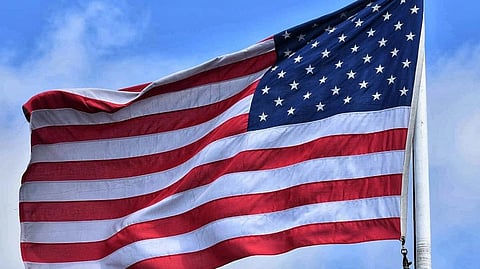FEATURE | Is the US considering a new ship registry in the US Virgin Islands?
President Donald Trump's administration is considering a proposal to create an international shipping registry in the US Virgin Islands as part of efforts to enlarge the tiny commercial shipping fleet flying the American flag, according to four sources familiar with the matter.
Increasing the number of US-flagged vessels is important for Trump's administration because it would enhance the ability of the US commercial shipping fleet to provide logistical support for the military in time of war, and ease Washington's dependence on foreign ships to transport supplies and equipment across sea lanes.
The US-flagged fleet currently numbers around 187 vessels, of which only 80 are involved in international trade. This contrasts with at least 5,500 of vessels under China's control, according to industry estimates and assessments from US lawmakers.
The US flag registry has struggled to attract ship owners for decades due to higher costs, a bigger tax burden and multiple requirements such as having a crew of US citizens. China has become the world’s top shipbuilding and shipping nation with 230 times more shipbuilding capacity than the US, a congressional report showed last year.
Using the US Virgin Islands (USVI) could be the most efficient way to "strengthen American maritime posture" because the island territory could provide a US-controlled flag without the costly restrictions associated with a straight US flag registration, according to Eric Dawicki, President of the Center for Ocean Policy and Economics (COPE) research body, which submitted the proposal to US officials.
All commercial ships must be registered, or flagged, with a particular country or jurisdiction to comply with safety and environmental rules.
A US official said the proposal had been submitted to the National Security Council, adding it was unclear on the status. Another US official confirmed that the National Security Council was aware of the proposal.
White House and USVI officials did not respond to requests for comment.
In previous conflicts, such as the 1991 Gulf War, the US relied upon foreign-flagged vessels to bolster shipping access.
"The ongoing reliance on voluntary charter arrangements with foreign-flagged vessels to supplement America’s sealift capacity poses a strategic vulnerability to US maritime interests," said COPE's Dawicki, a US maritime industry veteran who co-founded the Dominica flag registry.
While some lawmakers support the idea of a US Virgin Islands registry, the proposal is likely to face opposition from unions and others keen for a revival in domestic shipbuilding.
"The USVI is an alternative, but it probably will not get much support with the drive to enlarge the US fleet," said Salvatore Mercogliano, Associate Professor of History at North Carolina’s Campbell University and Adjunct Professor at the US Merchant Marine Academy.
National flag
The majority of US-flagged ships operate under a century-old protectionist regulation called the Jones Act. That law requires that US-flagged vessels be built in the US, employ a US crew, and be owned by an American individual or entity.
Those requirements were meant to help US shipowners but they ultimately limited growth of the US fleet, said Basil Karatzas, US-based consultant with shipping specialists Karatzas Marine Advisors Co.
"As a national flag, it can never compete on cost with foreign nationals' labor."
Unlike with the US-flag, which is vetted by the US Coast Guard, the USVI authority would administer and regulate an international registry that imposes fewer requirements, according to COPE. The vessels, for example, could be foreign built and crewed by non-US nationals, it said.
The US Coast Guard and union officials did not respond to requests for comment.
During World War II, the US Merchant Marine - a civilian organization of the commercial fleet - played a vital role in defeating the Axis powers, with over 10,000 ocean-going vessels involved in operations, according to US data.
The US fleet current represents under one per cent of global shipping by value, separate US data showed.
The idea to create an international flag in the USVI was first discussed by industry officials and COPE in 2022 although it was not submitted to the previous administration under former President Joe Biden, COPE said.
Trump's administration is pushing for a regeneration of US shipbuilding as well as attracting more ships to the US flag registry.
There are around 20 shipyards in the US - many ageing and in need of major investment, down sharply from over 80 at the end of World War II, according to US lawmakers.
On April 30, US Congress members from both parties launched the SHIPS for America bill that seeks to bolster and secure consistent funding for the US maritime industry.
Dawicki said a USVI registry would complement the SHIPS Act, "without affecting cabotage (coast to coast shipping) or the Jones Act."
Senator Todd Young's office, one of the lawmakers involved in the bill, did not respond to a request for comment.
(Reporting by Jonathan Saul and Jarrett Renshaw; editing by Simon Webb, Richard Valdmanis and David Gregorio)


